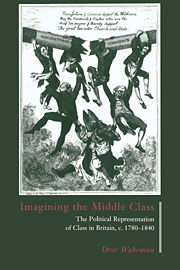Book contents
- Frontmatter
- Contents
- List of figures
- Acknowledgments
- 1 Imagining the ‘middle class’: an introduction
- PART I AGAINST THE TIDE
- PART II THE TUG OF WAR
- PART III WITH THE TIDE
- 7 The social construction of the ‘middle class’
- 8 The parallels across the Channel: a French aside
- 9 The debates on the Reform Bill: bowing to a new representation of the ‘middle class’
- 10 Inventing the ever-rising ‘middle class’: the aftermath of 1832
- 11 1832 and the ‘middle-class’ conquest of the ‘private sphere’
- Epilogue
- Index
9 - The debates on the Reform Bill: bowing to a new representation of the ‘middle class’
Published online by Cambridge University Press: 08 January 2010
- Frontmatter
- Contents
- List of figures
- Acknowledgments
- 1 Imagining the ‘middle class’: an introduction
- PART I AGAINST THE TIDE
- PART II THE TUG OF WAR
- PART III WITH THE TIDE
- 7 The social construction of the ‘middle class’
- 8 The parallels across the Channel: a French aside
- 9 The debates on the Reform Bill: bowing to a new representation of the ‘middle class’
- 10 Inventing the ever-rising ‘middle class’: the aftermath of 1832
- 11 1832 and the ‘middle-class’ conquest of the ‘private sphere’
- Epilogue
- Index
Summary
The elective franchise ought only to be intrusted to those, who would exercise it with the most wisdom and independence; and as wisdom and independence certainly, prevail more in the middling ranks, than in the whole mass of the people, the elective franchise should accordingly be principally enjoyed by them … yet the benefits which would flow from a representative body, properly constituted, would be general … the poor, as well as the rich, would equally partake of them.
(John Sinclair, advocate of moderate reform, 1831)The poorer classes in general have an understanding sufficiently just, docile, and unprejudiced to elect and to submit to the same legislators whom the middling classes themselves … would single out … [Under a radical enfranchisement of a million voters, the elected nevertheless would still be] identified in heart and spirit with the happiness of the middling classes.
(George Grote, advocate of radical reform, 1831)The qualification they have adopted, will have the effect of introducing, not this intelligent and educated portion of the middle ranks alone, but a vast majority very differently endowed … I am sure, that to no portion of the community would this measure be practically more unsatisfactory, than to that valuable part of the middle classes, who would be thus confounded with those so much their inferiors.
(Sir John Walsh, opposer of reform, 1831)- Type
- Chapter
- Information
- Imagining the Middle ClassThe Political Representation of Class in Britain, c.1780–1840, pp. 298 - 327Publisher: Cambridge University PressPrint publication year: 1995



